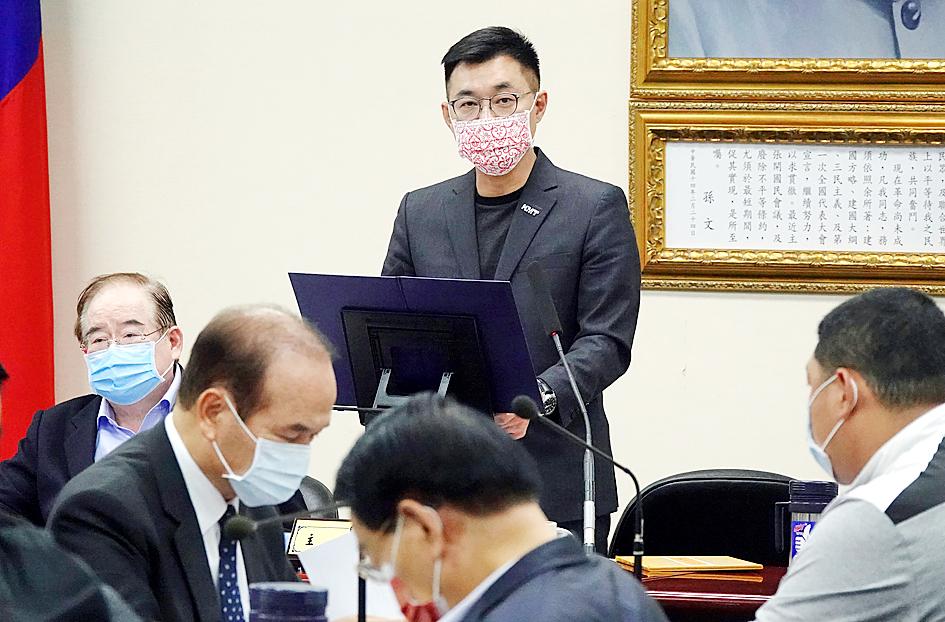The Chinese Nationalist Party (KMT) elections for its chairperson and delegates of its National Congress are to be held on July 24, the party announced yesterday.
Those seeking to contest the elections must pick up registration forms on June 3 or 4 and submit them on June 7 or 8, the KMT said in a statement.
Vote counting would begin the same day as the elections, it said, adding that a list of the elected candidates would be announced by July 27.

Photo: CNA
The dates were announced after the KMT’s Central Standing Committee approved them at a meeting in Taipei.
The committee also approved a requirement that candidates for KMT chairperson pay a registration fee of NT$200,000 (US$7,153) when they pick up their registration forms, and a NT$3 million processing fee and NT$10 million deposit when they register, the KMT said.
The deposit would be credited to the winning candidate’s annual fundraising obligations as chairperson and returned to unsuccessful candidates, the party said.
To encourage the participation of young people, the committee approved a rule allowing the chairperson to select up to 30 student delegates to join the 1,550-seat National Congress, the KMT said.
“Party elections are not a head-to-head battle, much less a zero-sum game,” KMT Chairman Johnny Chiang (江啟臣) said at the beginning of the committee meeting, before it was closed to reporters.
Rather, they are an exercise of democracy that decide how work is to be assigned in the party for the following few years, said Chiang, who is seeking re-election.
“We hope that the KMT, united under a fair system, can win back the confidence of a majority of Taiwanese and gain more opportunities to serve the nation, regardless of who is leading it,” he said.
Referendums to be held on Aug. 28 are “not only the party’s most important political task this year, but also a challenge that the whole party must face together,” Chiang said.
“The KMT has no other path but to unite,” he said.
The KMT has made two referendum proposals, one that asks voters if they agree that the government should impose a complete ban on imports of meat, offal and other pork products containing residue of the feed additive ractopamine, and one that asks if they agree that referendums should be held on the same day as national elections if an election is scheduled to take place within six months of a proposal to hold a referendum being approved.

Taiwan has received more than US$70 million in royalties as of the end of last year from developing the F-16V jet as countries worldwide purchase or upgrade to this popular model, government and military officials said on Saturday. Taiwan funded the development of the F-16V jet and ended up the sole investor as other countries withdrew from the program. Now the F-16V is increasingly popular and countries must pay Taiwan a percentage in royalties when they purchase new F-16V aircraft or upgrade older F-16 models. The next five years are expected to be the peak for these royalties, with Taiwan potentially earning

STAY IN YOUR LANE: As the US and Israel attack Iran, the ministry has warned China not to overstep by including Taiwanese citizens in its evacuation orders The Ministry of Foreign Affairs (MOFA) yesterday rebuked a statement by China’s embassy in Israel that it would evacuate Taiwanese holders of Chinese travel documents from Israel amid the latter’s escalating conflict with Iran. Tensions have risen across the Middle East in the wake of US and Israeli airstrikes on Iran beginning Saturday. China subsequently issued an evacuation notice for its citizens. In a news release, the Chinese embassy in Israel said holders of “Taiwan compatriot permits (台胞證)” issued to Taiwanese nationals by Chinese authorities for travel to China — could register for evacuation to Egypt. In Taipei, the ministry yesterday said Taiwan

Taiwan is awaiting official notification from the US regarding the status of the Agreement on Reciprocal Trade (ART) after the US Supreme Court ruled US President Donald Trump's global tariffs unconstitutional. Speaking to reporters before a legislative hearing today, Premier Cho Jung-tai (卓榮泰) said that Taiwan's negotiation team remains focused on ensuring that the bilateral trade deal remains intact despite the legal challenge to Trump's tariff policy. "The US has pledged to notify its trade partners once the subsequent administrative and legal processes are finalized, and that certainly includes Taiwan," Cho said when asked about opposition parties’ doubts that the ART was

If China chose to invade Taiwan tomorrow, it would only have to sever three undersea fiber-optic cable clusters to cause a data blackout, Jason Hsu (許毓仁), a senior fellow at the Hudson Institute and former Chinese Nationalist Party (KMT) legislator, told a US security panel yesterday. In a Taiwan contingency, cable disruption would be one of the earliest preinvasion actions and the signal that escalation had begun, he said, adding that Taiwan’s current cable repair capabilities are insufficient. The US-China Economic and Security Review Commission (USCC) yesterday held a hearing on US-China Competition Under the Sea, with Hsu speaking on